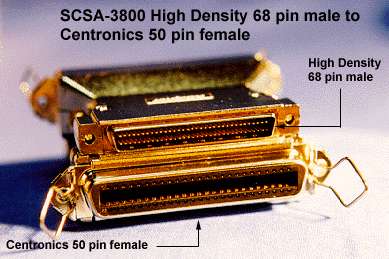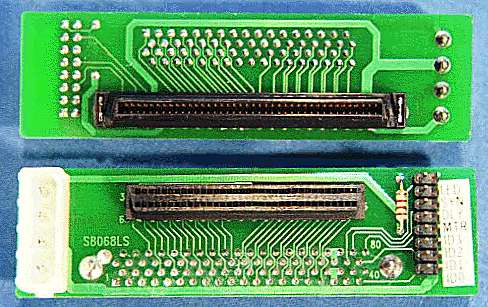[ The PC Guide | Systems and Components Reference Guide | Hard Disk Drives | Hard Disk Interfaces and Configuration | Small Computer Systems Interface (SCSI) | SCSI Cables and Connectors ]
SCSI Adapters
With so many different types of SCSI protocols, cables and connection methods, it's no surprise that there also exists on the market an enormous number of different SCSI adapters. These devices are generally manufactured and sold by the same people who make and sell SCSI cables, and are intended to solve some of the problems that crop up when SCSI users try to interconnect different kinds of SCSI hardware.
There are probably over a hundred different types of SCSI adapters available; some of the most popular ones fall into these general categories:
- Mechanical Connector Adapters: The most common types of adapters are used to allow devices with different types of connectors to be used on the same cable. These are simple, purely mechanical adapters that don't contain any logic or live circuitry, and are relatively inexpensive. For example, you might have an existing external SCSI cable using high density connectors, and want to add to the SCSI chain a device that has a Centronics connector. There are dozens of different connector adapters, reflecting the myriad of combinations of connector types.
- SCA Adapters: These are adapters that let you use SCA drives on regular systems that don't have SCA backplanes.
- Wide/Narrow Adapters: Adapters that let you put a narrow SCSI device on a wide cable or vice-versa. There are complications involved in doing this; see here for more.
- Internal/External Adapters: Adapters that let you use an internal cable outside the PC.
- Signaling Method Adapters: Adapters that let you use differential drives on a single-ended SCSI chain or vice-versa. These are electrically active adapters and are generally expensive.
- Interface Adapters: Adapters that let you use SCSI devices on other interfaces; the most common is an adapter to let you use certain types of SCSI drives on a PC's parallel port. Again, these can be a bit expensive. Also, you will be limited to (at best) the maximum speed of whichever interface is slowest.
|
Two adapters that are representative of two categories
of adapter |
Original images � Computer Cable Makers, Inc. |
It's important to remember that there can be reliability issues with using adapters. It might be possible to mate two devices to each other with the use of a mechanical adapter, but that doesn't mean that the interface will necessarily function reliably with that configuration. To some extent it depends on the nature of the SCSI bus being implemented, and the quality of the hardware. In some cases adapters work just fine with no problems, but in others getting everything to work together can be a bit tricky. It's best to consult with a qualified hardware vendor if you are unsure of how to make different devices work together.
Another aspect to keep in mind is that the cost of some SCSI adapters can be very high. It might be possible to adapt one type of device to use it with a very different type of host adapter, but in many cases it will not be cost-effective. Some adapters are so expensive that it would be cheaper to get a new cable, host adapter or other "incompatible" hardware rather than buy the adapter. This is particularly true of adapters that change between signaling methods.
![]() Next: SCSI Bus Termination
Next: SCSI Bus Termination
| The PC Guide
(http://www.PCGuide.com) Site Version: 2.2.0 - Version Date: April 17, 2001 © Copyright 1997-2004 Charles M. Kozierok. All Rights Reserved. |
Not responsible for any loss resulting from the use of this site. Please read the Site Guide before using this material. |

